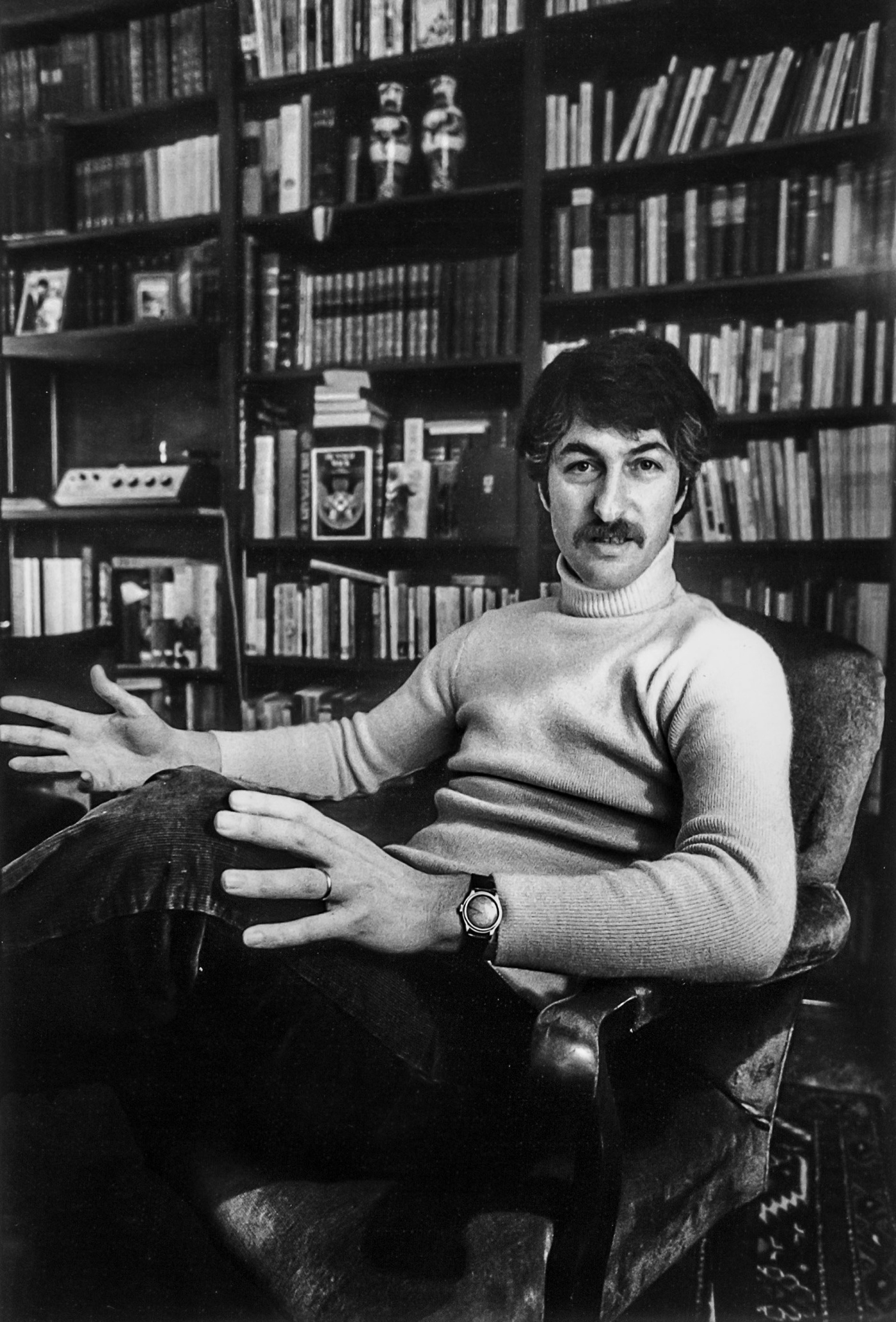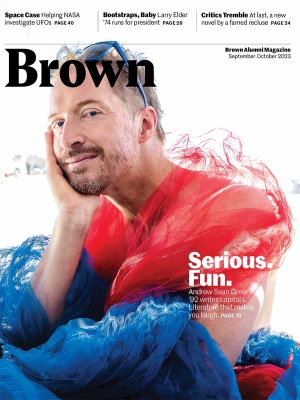Human Studies
Professor emeritus Arnold Weinstein reflects on the “vicarious, experiential, and enlarging” field of comparative literature.
Lou Gehrig famously said, when he spoke at Yankee Stadium in 1939 about his ALS condition, that he nonetheless thought himself the luckiest man on the face of the earth. I don’t have ALS, and this is not Yankee Stadium, but after 54 years of teaching at Brown, I do consider myself amazingly lucky in my career. It was my first and only job, and I have loved it.

Part of my luck was with the timing: I arrived at Brown in 1968, with a newly minted PhD in comparative literature. A scant year or so after getting here, this university experienced something close to a metamorphosis. Two undergraduates—Elliott Maxwell ’68 and Ira Magaziner ’69—had written an honors thesis defining a (then) revolutionary view of education: one that eliminated distribution requirements, introduced a credit/no credit grading option, and made Brown astonishingly student-centric in its educational philosophy. Much of what they wrote owed a debt to the crucial influence of Professor George Morgan (the godfather of this curriculum) whose (wonderful) program “human studies”was their “home.”
These were parlous times, with considerable student protest at many universities. The broader Brown University faculty played its role, rethinking its educational philosophy, and ultimately implementing a number of the human studies key concepts on an institutional level. Thus, Brown’s ‘New Curriculum’—now known as the Open Curriculum—was born. Brown was changed, almost overnight.
So, too, was I. For I had had the great good luck to join the tiny group of faculty members in human studies, way back then. The traditional view of literature I had absorbed at both Princeton (BA) and Harvard (PhD)—literature came packaged in genres and languages and centuries—became something freer, more adventuresome, more dimensional. And for more than 50 years my courses have been in the spirit of “human studies,” even if I continue to think that literature, in addition to cohabiting with other disciplines, shines a unique (and uniquely valuable) light on human affairs. That conviction that literature illuminates our life—inwardly, but also relationally and historically—has been the core belief of my teaching and my writing.
As an identical twin, often mistaken in my childhood for my twin brother, I have felt, from birth on, that our individual contours—what we assume as fixed and stable—are blurrier and more changeable than we realize. This feeds my view that reading literature is unlike reading in any other field: it catapults us into faraway times, places, and people. It is vicarious, experiential, and enlarging. We ourselves thereby become more dimensional, because we taste other subjectivities and fates. No other field offers quite this. Books of literature look docile—you can hold them in your hands or read them on a screen—but they’re actually fissile, sources of projection, outright munitions: they need no 2nd Amendment protection, for they are the arms we bear, from the moment we can read, write, or speak. I tried to spell all of this out in my latest book, The Lives of Literature: Reading, Teaching, Knowing (Princeton UP, 2021), but it has been my vision ever since my work in human studies.
And I have much to be grateful for: Brown has been a liberal, fertile, welcoming locus for this view. I believe many of our best young people come to Brown for these reasons: to discover, in their courses, something vital, perhaps transformative, not only in the texts they read, but also in themselves as they negotiate them.
Of course, much has changed since I first arrived. The campus scarcely looks the same; the medical school didn’t exist; computer science was an exotic newcomer; the endowment was measured in six, not 10, figures. But there exists a beguiling professorial sense that undergraduates are, always and ever, young people, roughly between 18 and 21, thereby concealing from us the queasy fact that we are the folks who are changing. My field certainly has. Comparative literature was comfortably Eurocentric back then, but no longer; humanities departments had tons of concentrators back then, but no longer. The acronym STEM hadn’t been coined. Pembroke hadn’t even been folded into Brown. The faculty teaching load was six courses a year. My hair wasn’t white back then. Time is real.
Not only am I subject to the kind of slow-moving brain-rot that afflicts most folks my age, but my own curriculum—many of the books I most love to teach—now seems to be imploding before my eyes. Writers such as Faulkner—awash in ideological assumptions that both you and I reject, yet astounding in imaginative reach and, yes, moral vision—have become unteachable, indeed toxic. Born in Memphis in 1940, I graduated from public school in 1958—prior to the landmark civil rights movement and legislation that came not long afterwards—and as I now look back, I see with great clarity how America’s structural racism literally book-ends my career with a nasty Memphis signature: Martin Luther King was murdered there in the spring of 1968, right before I came, and Tyre Nichols suffered a similar fate there in January 2023, right after I retired. Faulkner lived an hour’s drive from Memphis, and I love his books because I see him as our greatest tragic writer, the one who takes the measure of the place where he was born and lived all his life, and then finds unforgettable ways to recognize, indeed to explore, America’s darkest sins, while still loving his “postage stamp of soil.”
As a stubborn old man, I still believe that Brown students need to encounter materials of this stripe—written at “ground zero,” one might say—but I’ve learned first-hand how unpalatable Faulkner now is. And, if I add issues of gender and sexuality (and their long histories of systemic abuse and injustice) to the mix, other writers in my courses, such as Strindberg, Proust, and Coetzee, join the list of ‘untouchables.’ Yet, this is also the gift that the young bring, year in and year out: to want a more just world. How could it not impact their reading literature? Can professors stay abreast?
The discovery that some of one’s favorite books offend teaches the teacher something about “quittin’ time,” as the professor realizes that the quintessential, wonderfully elastic bond that links students and professors—the social contract that underwrites teaching itself—can only go so far. A dear friend who retired just a few years ago assured me that I would know when it was time to retire. She was right. There is a season for everything, including exit.
The enduring question that haunts all retirees, whatever their field or profession, is: “What has it meant?” Or, in its more intimate form: “What have I achieved?” It has always stunned me how little we know about these late-stage reckonings and ultimacies. And, as a literature professor, the question seems even more unanswerable. For 54 years, young people took my courses and read—probably—the books I assigned. And, of course, they wrote papers on my materials. But, what do you actually know after you’ve read or written a novel or poem? Certainly nothing “factual” on the order of what a course on molecular biology or computer coding would yield.
What I want to believe is: I have “seeded” readers. I’ve helped at least some of the many young Brown students coming my way for 54 years to see that literature shines a precious beam on life in all its guises: psychological, emotional, social, ideological, at once historical and universal. I want to believe I’ve helped school their lenses, their way of seeing. Maybe even their capacity to feel. No way to prove any of this, but it is a comforting notion—fantasy?—at the end of one’s career.
Arnold Louis Weinstein is Brown’s Richard and Edna Salomon Distinguished Professor Emeritus of Comparative Literature and has been honored by institutions as various as the National Endowment for the Humanities and Oprah Winfrey’s book club.




